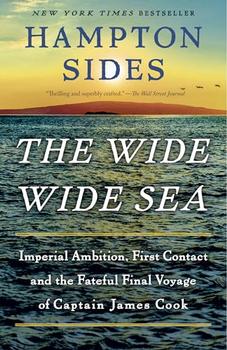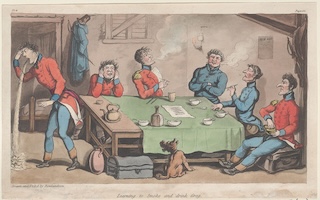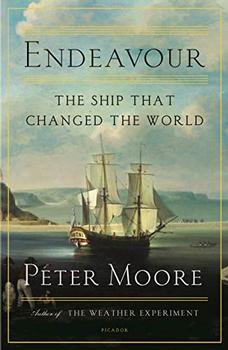Summary | Excerpt | Reading Guide | Discuss | Reviews | Beyond the book | Read-Alikes | Genres & Themes | Author Bio

Imperial Ambition, First Contact and the Fateful Final Voyage of Captain James Cook
by Hampton SidesFrom New York Times bestselling author Hampton Sides, an epic account of the most momentous voyage of the Age of Exploration, which culminated in Captain James Cook's death in Hawaii, and left a complex and controversial legacy still debated to this day
On July 12th, 1776, Captain James Cook, already lionized as the greatest explorer in British history, set off on his third voyage in his ship the HMS Resolution. Two-and-a-half years later, on a beach on the island of Hawaii, Cook was killed in a conflict with native Hawaiians. How did Cook, who was unique among captains for his respect for Indigenous peoples and cultures, come to that fatal moment?
Hampton Sides' bravura account of Cook's last journey both wrestles with Cook's legacy and provides a thrilling narrative of the titanic efforts and continual danger that characterized exploration in the 1700s. Cook was renowned for his peerless seamanship, his humane leadership, and his dedication to science-–the famed naturalist Joseph Banks accompanied him on his first voyage, and Cook has been called one of the most important figures of the Age of Enlightenment. He was also deeply interested in the native people he encountered. In fact, his stated mission was to return a Tahitian man, Mai, who had become the toast of London, to his home islands. On previous expeditions, Cook mapped huge swaths of the Pacific, including the east coast of Australia, and initiated first European contact with numerous peoples. He treated his crew well, and endeavored to learn about the societies he encountered with curiosity and without judgment.
Yet something was different on this last voyage. Cook became mercurial, resorting to the lash to enforce discipline, and led his two vessels into danger time and again. Uncharacteristically, he ordered violent retaliation for perceived theft on the part of native peoples. This may have had something to do with his secret orders, which were to chart and claim lands before Britain's imperial rivals could, and to discover the fabled Northwest Passage. Whatever Cook's intentions, his scientific efforts were the sharp edge of the colonial sword, and the ultimate effects of first contact were catastrophic for Indigenous people around the world. The tensions between Cook's overt and covert missions came to a head on the shores of Hawaii. His first landing there was harmonious, but when Cook returned after mapping the coast of the Pacific Northwest and Alaska, his exploitative treatment of the Hawaiians led to the fatal encounter.
At once a ferociously-paced story of adventure on the high seas and a searching examination of the complexities and consequences of the Age of Exploration, The Wide Wide Sea is a major work from one of our finest narrative nonfiction writers.
In July 1776 Cook left England on his final—and fatal—voyage. It's this tale of exploration and tragedy that Hampton Sides relays in his nonfiction account, The Wide Wide Sea.
It's unfortunate that there are so few records of Cook's actions from the perspective of the residents of the lands he "discovered," but many of Cook's men left behind journals. Sides laboriously combed through an extensive trove of documents squirreled away across the globe, combining the many sources to paint a nuanced picture of the captain and events that transpired on the journey. He's an expert in providing enough detail to get readers hooked on a story without allowing it to bog down the book's flow, and his skill is on full display here...continued
Full Review
 (763 words)
(763 words)
(Reviewed by Kim Kovacs).
 Hampton Sides' book The Wide Wide Sea records the third and final voyage of Captain James Cook and relays some of the exploits of his crew aboard the HMS Resolution. One of Cook's key decisions concerned an alcoholic drink known as "grog."
Hampton Sides' book The Wide Wide Sea records the third and final voyage of Captain James Cook and relays some of the exploits of his crew aboard the HMS Resolution. One of Cook's key decisions concerned an alcoholic drink known as "grog."
During the Age of Exploration—the 15th to 18th centuries—Royal Navy ships would leave English harbors to sail to unknown lands. No one knew how long ships might be at sea before they would reach a location where they might re-stock their provisions. The food situation was quickly figured out; the vessels were outfitted with items that wouldn't spoil quickly (like hardtack, a sort of dense biscuit), supplemented with animals brought along for the purpose.
Water was ...

If you liked The Wide Wide Sea, try these:

by David Grann
Published 2025
Winner: BookBrowse Nonfiction Award 2023
From the #1 New York Times bestselling author of Killers of the Flower Moon, a page-turning story of shipwreck, survival, and savagery, culminating in a court martial that reveals a shocking truth. The powerful narrative reveals the deeper meaning of the events on The Wager, showing that it was not ...

by Peter Moore
Published 2020
An unprecedented history of the storied ship that Darwin said helped add a hemisphere to the civilized world.



The worst thing about reading new books...
Click Here to find out who said this, as well as discovering other famous literary quotes!